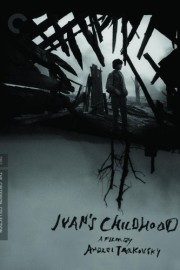Ivan’s Childhood
(I have also written about “Ivan’s Childhood” for a roundtable discussion for The Inner Circle on reviews that found unexpected afterlife. You can read that here.
Has there ever been a filmmaker whose use of black-and-white cinematography has been more evocative than Andrei Tarkovsky’s? Perhaps Ingmar Bergman, but even the Swedish master might suggest that Tarkovsky surpassed him; after all, it was Bergman who said, after watching Tarkovsky’s feature debut, “Ivan’s Childhood,” that, “Suddenly I found myself standing at the door of a room, the keys to which, until then, had never been given to me…Tarkovsky is for me the greatest, the one who invented a new language, true to the nature of film, as it captures life as a reflection, life as a dream.” Such words are akin to when Sergei Eisenstein, whose own “Battleship Potemkin” was widely considered such, called “Snow White and the Seven Dwarfs” the greatest film ever made when it debuted in 1937.
But watching “Ivan’s Childhood” again, for the first time in years, one can understand Bergman’s excitement. True, the film was later eclipsed by the Russian director’s next film, “Andrei Rublev,” as well as more lyrical and experimental films such as “The Mirror” and “Stalker,” but “Childhood” contains many of the elements that would come to define Tarkovsky’s films: a roving camera, as much interested in the surroundings of a character as it is the character themselves; visions or flashbacks that resonate for the emotional connection they give us to the characters, rather than any narrative significance they may carry; and a spiritual center that challenges us to find how the themes Tarkovsky is expressing can help us in our own journey through life. Few filmmakers have been so ambitious, let alone expressed such bold artistic choices right off the bat.
Aiding Tarkovsky in his cinematic challenges this time out is an unforgettable performance by Nikolai Burlyaev as Ivan, a 12-year-old boy whose family has been killed by the Germans during WWII; now, he has become a useful spy and runner for the Russian officers on the front lines, with nothing to live for but vengeance. Even as several of the officers try to convince Ivan that war is not the place for him, that he has done enough for the cause, and that he should go to school, Ivan’s resolve is absolute. Burlyaev brings Ivan’s demons to the surface in a performance that ranks with the greatest by a child ever, even though his next performance for Tarkovsky, as the bell-maker at the end of “Rublev,” is the role that leaves an indelible impression on me. But in reality, both Ivan and Boriska, Burlyaev’s character in “Rublev,” are really extensions of one another: both characters have been met with deaths close to them, and see an opportunity to define themselves in extraordinary situations– Ivan as a loyal partisan to the cause of winning the war, Boriska in claiming to be versed in the secrets of bell-casting when a Russian prince is in search of his long-dead father to re-cast a church bell. Both actions are reckless and the acts of arrogant boys who don’t see any other way to survive in their times, but because we come to understand their motivations, we find ourselves sympathetic to their choices.
Restored to its original running time of 95 minutes after years of truncation, “Ivan’s Childhood” can tax the patience of even the most devoted of Tarkovsky fans, especially as the film (based on the novella, Ivan, by Vladimir Bogomolov, who wrote the script with Mikhail Papava) veers off into unrelated scenes to the story, such as those with Ivan’s mother (Irina Tarkovskaya) or, most especially, a scene in the woods between two soldiers, who seem to be dancing around romantic possibilities. As the years went on, Tarkovsky would continue to finesse and fine tune his filmmaking aesthetic, which he later laid out in his invaluable book, Sculpting in Time, with each project, whether it was the accessible, emotional sci-fi of his best-known film in the West, “Solaris” or the static, distanced drama of his final film, “The Sacrifice,” which he shot on Bergman’s home island of Faro, with his frequent star (Erland Josephson) and cinematographer (Sven Nykvist). But Tarkovsky and Burlyaev make Ivan’s journey into the darkness of war a visually and emotionally painful experience, and gave us a glimpse of the great things ahead for both actor and director.










